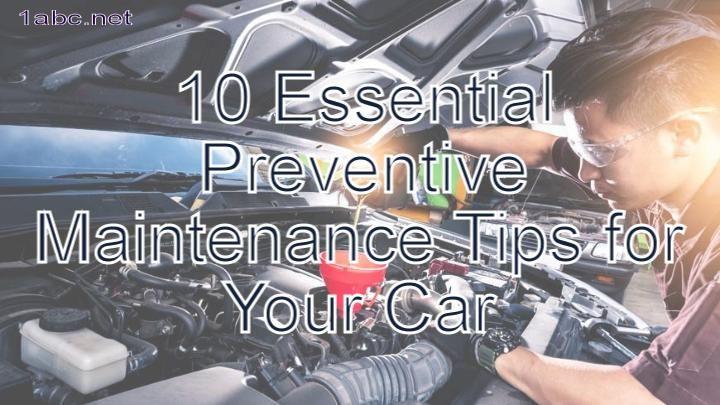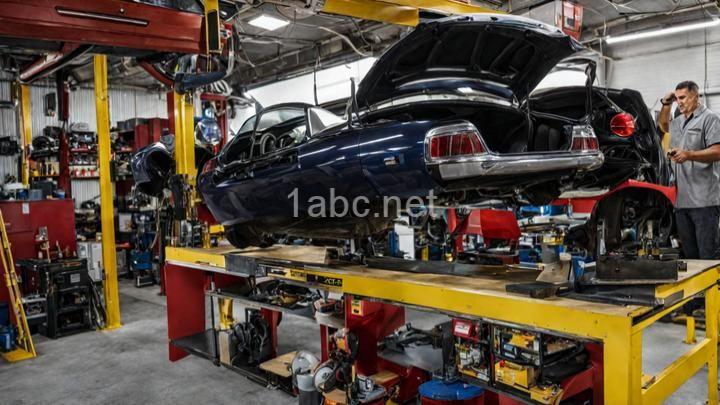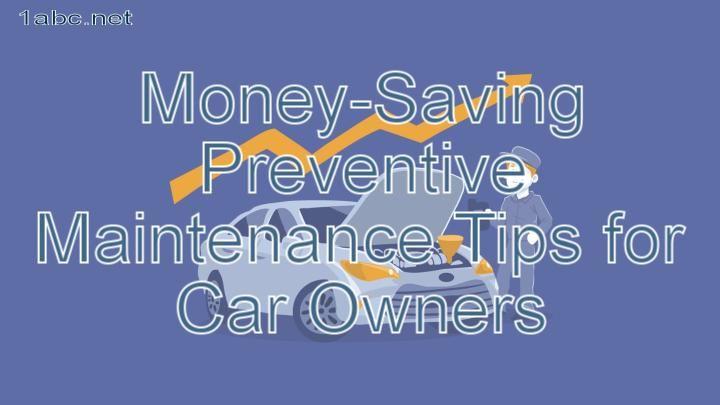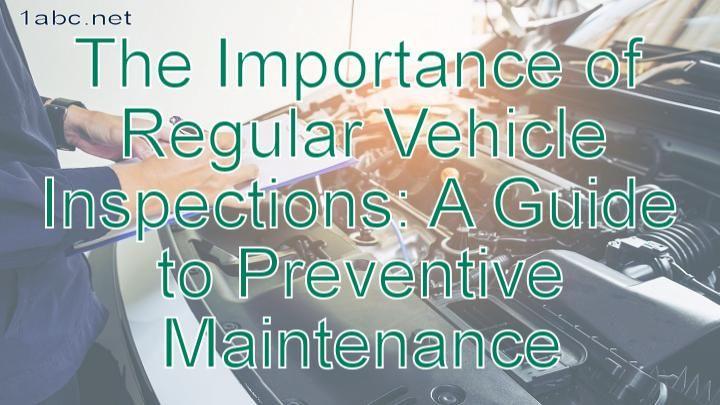10 Essential Preventive Maintenance Tips for Your Car
Introduction:
I. Check Fluid Levels Regularly:
II. Change Engine Oil and Filter:
III. Inspect and Replace Filters:
IV. Keep Tires in Optimal Condition:
V. Maintain Battery Health:
VI. Pay Attention to Brakes:
VII. Inspect Belts and Hoses:
VIII. Maintain a Clean Interior and Exterior:
IX. Follow Service Schedule & Owner's Manual:
X. Find a Trusted Mechanic:
Conclusion:

Introduction:
Hello, car enthusiasts! Welcome to our blog post on 10 Essential Preventive Maintenance Tips for Your Car. We understand that your car is not just a means of transportation; it's a valuable asset that deserves the best care possible. Regular preventive maintenance is the key to keeping your vehicle in top shape and ensuring its longevity on the road. In this article, we will provide you with 10 essential tips that will help you maintain your car's performance, safety, and overall condition. So, let's dive in and learn how to take care of your beloved automobile!
I. Check Fluid Levels Regularly:
One of the most crucial aspects of preventive maintenance is monitoring fluid levels. Your car relies on various fluids, such as engine oil, coolant, brake fluid, and power steering fluid, to function optimally. Regularly checking these fluid levels is essential to prevent potential damage and ensure smooth operation. To check the engine oil level, locate the dipstick, pull it out, wipe it clean, reinsert it, and then check the oil level. Similar procedures can be followed for other fluids. Neglecting fluid maintenance can lead to engine overheating, decreased brake performance, or even engine failure.
II. Change Engine Oil and Filter:
Changing the engine oil and filter at regular intervals is vital for maintaining your engine's health. Over time, engine oil accumulates dirt, debris, and contaminants that can hinder its lubricating properties. This can result in increased friction, wear and tear, and reduced engine efficiency. To change the engine oil, first, drain the old oil by removing the drain plug. Then, remove the old oil filter and replace it with a new one. Finally, refill the engine with the recommended amount of fresh oil. Refer to your car's owner's manual for the manufacturer's recommended frequency for oil changes.
III. Inspect and Replace Filters:
Air, fuel, and cabin filters play a crucial role in keeping your car's engine and interior clean. Regularly inspecting and replacing these filters is essential for optimal performance and longevity. To check the air filter, remove the filter housing, inspect the filter for dirt and debris, and replace it if necessary. Fuel filters are typically located along the fuel line or inside the fuel tank and should be replaced periodically. Cabin filters, responsible for maintaining clean air inside the car, should be checked and replaced as recommended by the manufacturer. Clean filters improve engine efficiency and protect occupants from allergens and pollutants.
IV. Keep Tires in Optimal Condition:
Proper tire maintenance is essential for both safety and fuel efficiency. Regularly inspecting your tires, rotating them, and maintaining the correct tire pressure can significantly extend their lifespan. Uneven tread wear indicates the need for rotation, which should be done according to the manufacturer's guidelines. Checking the tire pressure and adjusting it to the recommended PSI ensures optimal handling and fuel economy. Additionally, professional tire inspections can identify potential issues, such as bulges, punctures, or worn-out tread, that may require immediate attention.
V. Maintain Battery Health:
A healthy battery is crucial for reliable starting power and electrical system functionality. To ensure your battery stays in top condition, periodically check the battery connections for tightness and cleanliness. Corroded terminals can hinder proper electrical flow and lead to starting issues. Cleaning the terminals with a mixture of baking soda and water can help remove corrosion. Additionally, testing the battery voltage with a multimeter can help identify any potential issues. To extend battery life, avoid unnecessary electrical loads and consider disconnecting the battery if the vehicle will be idle for an extended period.
VI. Pay Attention to Brakes:
Regular brake inspections are vital for your safety and the safety of others on the road. Being aware of signs of brake wear or issues can prevent potential accidents. Squeaking or grinding noises, decreased braking performance, or a pulsating brake pedal are indicators that your brakes may need attention. Periodic brake pad replacements are necessary to ensure proper braking performance. It is advisable to have professional inspections to accurately assess the condition of your brake system and address any potential problems promptly.
VII. Inspect Belts and Hoses:
Belts and hoses play a crucial role in the overall function of your car. They facilitate the operation of various components, such as the alternator, water pump, and power steering. Regularly inspecting belts and hoses for signs of wear or damage is essential to prevent unexpected breakdowns or engine damage. Look for cracks, fraying, or bulges in belts, and replace them if necessary. Hoses should be checked for leaks, cracks, or bulges, and replaced as recommended by the manufacturer. Following the recommended intervals for belt and hose replacements will ensure your car operates smoothly and reliably.
VIII. Maintain a Clean Interior and Exterior:
Keeping both the interior and exterior of your car clean is not just about aesthetics; it plays a significant role in maintaining its overall condition. Regularly vacuuming the interior and wiping down surfaces helps prevent dirt and debris from causing premature wear. Washing and waxing the exterior not only enhances its appearance but also protects the paint from environmental damage. Regular cleaning also contributes to the resale value of your car, making it a worthwhile investment of your time and effort.
IX. Follow Service Schedule & Owner's Manual:
One of the most important tips for preventive maintenance is to follow your car's recommended service schedule and thoroughly read the owner's manual. The manufacturer's service schedule provides guidance on when to perform specific maintenance tasks, such as oil changes, filter replacements, and inspections. Adhering to these guidelines ensures that you address potential issues before they escalate, saving you from costly repairs down the line. The owner's manual contains valuable maintenance instructions specific to your car's make and model, empowering you to take better care of your vehicle.
X. Find a Trusted Mechanic:
Having a trusted mechanic or service center is essential for quality workmanship and peace of mind. When it comes to more complex maintenance tasks or repairs, it's crucial to find a reliable professional who understands your car's specific needs. Ask for recommendations from friends, family, or fellow car enthusiasts. Read online reviews and check certifications to gauge the reputation and expertise of the mechanic or service center you are considering. A trusted mechanic will provide you with honest advice, transparent pricing, and ensure that your car receives the best care possible.
Conclusion:
Congratulations! You've made it through our comprehensive guide on 10 Essential Preventive Maintenance Tips for Your Car. By implementing these tips, you are taking significant steps towards prolonging your car's lifespan, ensuring its optimal performance, and safeguarding your safety on the road. Remember, preventive maintenance is an investment that pays off in the long run, saving you from costly repairs and unexpected breakdowns. Thank you for joining us on this maintenance journey, and we hope you continue to take care of your beloved vehicle. Happy driving!
FREQUENTLY ASKED QUESTIONS
What are preventive maintenance tips for my car?
Here are some preventive maintenance tips for your car:
- Regularly check and change the engine oil and oil filter.
- Keep an eye on the tire pressure and ensure the tires are properly inflated.
- Inspect the battery and clean the terminals regularly.
- Check and replace the air filters as recommended by the manufacturer.
- Regularly inspect and replace worn-out brake pads and rotors.
- Keep the cooling system in good condition by checking coolant levels and flushing the system when necessary.
- Check and replace worn-out spark plugs to ensure efficient fuel combustion.
- Inspect and replace any damaged or worn-out belts and hoses.
- Keep an eye on the transmission fluid and have it changed at recommended intervals.
- Regularly inspect and replace worn-out windshield wipers for clear visibility.
Following these preventive maintenance tips can help keep your car in optimal condition and prevent major breakdowns or costly repairs.
How often should I perform preventive maintenance on my car?
The frequency of preventive maintenance for your car depends on multiple factors such as the make and model of your vehicle, its age, mileage, and the manufacturer's recommendations. As a general guideline, it is recommended to perform preventive maintenance every 6 months or every 5,000 to 7,500 miles, whichever comes first. However, for more accurate information, I would suggest referring to your car's owner manual or consulting with a certified mechanic.
How do these maintenance tips help prolong the lifespan of my car?
Maintenance tips play a crucial role in prolonging the lifespan of your car in several ways:
- Regular oil changes: Changing the oil and oil filter at recommended intervals helps prevent engine wear and maintain proper lubrication, which promotes overall engine health and longevity.
- Scheduled inspections: Following the manufacturer's recommended maintenance schedule allows for early detection of any potential issues. Identifying and addressing problems early can prevent more severe damage and costly repairs later on.
- Tire maintenance: Maintaining proper tire pressure, rotating tires regularly, and ensuring they are properly aligned and balanced not only improves fuel efficiency but also reduces wear and tear on the suspension and steering components.
- Fluid checks and changes: Regularly checking and changing essential fluids such as coolant, transmission fluid, brake fluid, and power steering fluid can prevent overheating, transmission failure, brake system issues, and steering problems.
- Battery maintenance: Cleaning battery terminals, checking the battery charge, and ensuring secure connections can prevent starting issues and extend the life of your battery.
- Air filter replacement: Routine replacement of the air filter helps maintain proper airflow to the engine, improving fuel efficiency and preventing potential damage to engine components.
- Spark plug replacement: Worn-out or dirty spark plugs can affect fuel efficiency and engine performance. Regular replacement ensures proper combustion and prevents ignition-related issues.
- Keeping the exterior clean: Washing and waxing your car regularly helps protect the paint and prevent rust, thus preserving the overall condition and value of your vehicle.
By following these maintenance tips, you can enhance the performance, efficiency, and longevity of your car, preventing unnecessary breakdowns and expensive repairs down the road.
Are there any risks involved in neglecting preventive maintenance?
Yes, there are several risks involved in neglecting preventive maintenance. Here are some of the key risks:
- Increased breakdowns: Neglecting preventive maintenance can lead to unexpected breakdowns and equipment failure. This can result in costly repairs and downtime, disrupting normal operations.
- Reduced equipment lifespan: Regular inspections and maintenance help identify and address minor issues before they escalate, prolonging the lifespan of equipment. Neglecting preventive maintenance can lead to premature equipment failure and the need for costly replacements.
- Safety hazards: Some equipment failures can pose serious safety hazards to employees or customers. Regular maintenance helps identify and address potential safety risks, ensuring a safe working environment.
- Decreased efficiency: Poorly maintained equipment tends to operate less efficiently, leading to higher energy consumption and increased operating costs. Preventive maintenance helps optimize equipment performance, saving energy and money in the long run.
- Non-compliance with regulations: Depending on the industry, there might be specific regulations or standards that require regular maintenance and inspections. Neglecting preventive maintenance can result in non-compliance and potential legal consequences.
In summary, neglecting preventive maintenance can lead to increased breakdowns, reduced equipment lifespan, safety hazards, decreased efficiency, and non-compliance with regulations. It is essential to prioritize preventive maintenance to minimize these risks and ensure smooth operations.




